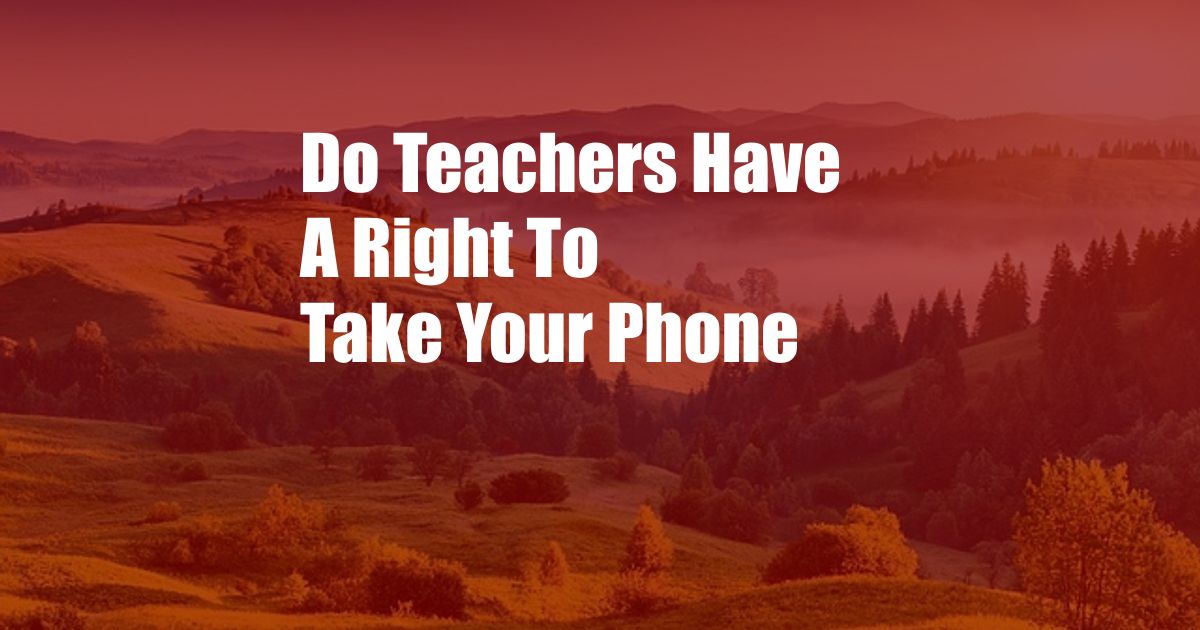
Teachers’ Rights to Confiscate Phones: Examining the Legal and Ethical Landscape
“Excuse me, Ms. Smith, can I have my phone back?” I hesitantly uttered those words, my heart pounding with trepidation. My phone had been confiscated during class for the third time that week. “Not until the end of class,” she replied, her tone unwavering.
This incident, and countless others like it, raises important questions about the legal and ethical implications of teachers confiscating students’ phones. While it’s understandable that teachers want to maintain a distraction-free learning environment, the question remains: do they have a right to take our phones?
Balancing School Discipline and Digital Rights
The issue of teachers confiscating student phones is a multifaceted one. On the one hand, schools have a legitimate interest in ensuring that students are focused and attentive during class time. Excessive phone use can be a significant distraction and can impede effective learning.
In recognition of this concern, many schools have implemented policies that restrict phone use during class time. These policies typically allow teachers to confiscate phones if they are used inappropriately or if they become a disruption to the learning process.
Legal Precedents and Ethical Considerations
Legally, the issue of phone confiscation is not entirely clear-cut. The Fourth Amendment of the U.S. Constitution, which protects against unreasonable searches and seizures, has been interpreted to apply to public schools.
However, courts have also recognized that schools have a special interest in maintaining order and discipline and that this interest may outweigh the privacy rights of students in certain circumstances. In other words, school officials may be justified in confiscating phones if they have a reasonable belief that the phone is being used for an inappropriate purpose.
Ethically, the issue of phone confiscation is just as complex. While it’s important for teachers to maintain a distraction-free environment, it’s also essential to respect the privacy of students. Phones have become an integral part of our lives, and many students rely on them for a variety of legitimate purposes, such as staying connected with parents, accessing educational resources, and managing their schedules.
Guidelines for Teachers: Confiscation and Beyond
Given the legal and ethical complexities of this issue, it’s essential for teachers to exercise discretion and to follow clear guidelines when confiscating phones. The following guidelines can help teachers navigate this challenging terrain:
- Only confiscate phones if there is a clear violation of school policy or if the phone is causing a disruption to the learning process.
- Establish clear expectations and consequences for phone use in advance, so that students are aware of the rules.
- Respect the privacy of students when confiscating phones. Do not access any personal information or messages without the student’s consent or the presence of a parent or guardian.
- Return the phone to the student as soon as possible, typically at the end of class.
- Consider alternative disciplinary measures, such as asking the student to put the phone away or to contact their parents to discuss the issue.
By following these guidelines, teachers can help to ensure that their phone confiscation policies are both effective and fair.
Tips for Students: Understanding Your Rights and Responsibilities
While teachers have certain rights when it comes to confiscating phones, students also have rights that they need to be aware of. Here are a few tips for students to help them understand their rights and responsibilities:
- Be respectful of your teachers and their authority. If you are asked to put away your phone, do so promptly and without argument.
- If your phone is confiscated, ask your teacher when you can expect to get it back.
- If you believe that your phone was confiscated unfairly, you may speak to your teacher or a school administrator to discuss the matter.
- Understand the school’s policy on phone usage and be sure to follow the rules.
By understanding their rights and responsibilities, students can help to create a more positive and productive learning environment for everyone.
Frequently Asked Questions
Q: Can teachers confiscate my phone even if I’m not using it in class?
A: In most cases, no. Teachers can only confiscate phones if they have a reasonable belief that the phone is being used for an inappropriate purpose or is causing a disruption to the learning process.
Q: What should I do if my phone is confiscated unfairly?
A: If you believe that your phone was confiscated unfairly, you should speak to your teacher or a school administrator to discuss the matter.
Q: What are the alternative disciplinary measures that teachers can use instead of confiscating phones?
A: Alternative disciplinary measures include asking the student to put the phone away, contacting the student’s parents to discuss the issue, or assigning detention.
Conclusion
The issue of teachers’ rights to confiscate phones is a complex one with no easy answers. However, by understanding the legal and ethical implications, and by following clear guidelines and best practices, teachers and students can work together to create a learning environment that is both productive and respectful.
Are you interested in learning more about this topic? Share your thoughts and questions in the comments below.